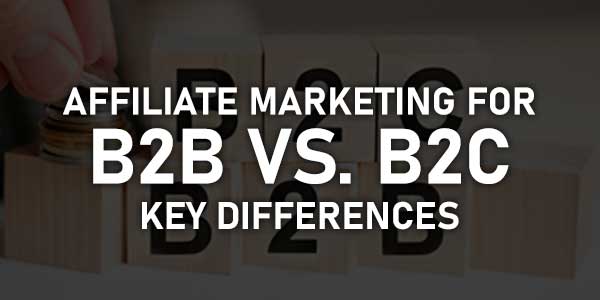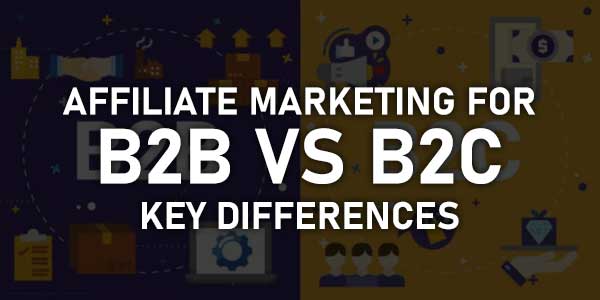
Welcome to the dynamic realm of affiliate marketing, where businesses strategically collaborate to boost their reach and revenue. In this exploration, we’ll navigate the nuances between affiliate marketing in the B2B (Business-to-Business) and B2C (Business-to-Consumer) landscapes. Uncover the distinct strategies that businesses employ to harness the power of partnerships, tailored to the unique demands of their target audiences.
Join us on this insightful journey as we unravel the key differences that shape the affiliate marketing landscape for B2B and B2C E-commerce enterprises.
Table of Contents
What Is B2B?
B2B, or Business-to-Business, is when one company does business with another. Instead of selling things directly to individuals like you and me, B2B involves companies selling products or services to other companies.
In these transactions, businesses deal with each other, and the focus is on meeting the specific needs and demands of other businesses rather than individual consumers. It often involves more complex negotiations and larger-scale deals compared to transactions with regular customers.
What Is B2C?
B2C or Business-to-Consumer, describes when a company sells products or services directly to individual customers. In this scenario, businesses focus on meeting the needs and preferences of everyday consumers.
So, when you make a purchase online or in a store, you’re engaging in a B2C transaction the business is selling directly to you as an individual customer.
Key Difference Between B2B And B2C In Affiliate Marketing:
Target Audience:
In the area of B2B affiliate marketing, the main focus is on the engagement of other businesses as well as professionals. This entails providing customized marketing services to address the individual professional issues and challenges of businesses.
The emphasis is on operational efficiency, which enhances processes, specializes professionals, and offers solutions. The messaging and promotional strategies are geared to the language of the decision-makers in a business perspective with specific industry words and demonstrating the tangible benefits to the organizational success.
B2C:
As for B2C affiliate marketing, its essence is the aim to reach specific consumers. This emphasizes advertising of personal use products and services. The marketing strategies are tailored to speak to consumers emotionally, based on their tastes and how they live their lives.
B2C affiliate marketing seeks to establish a relationship with an end user who is not a professional. It shows how the promoted products or services will benefit the user’s own experience or solve personal desire. This messaging is aimed at the consumers and is intended to impact their individual purchasing decisions.
Product or Service Orientation: B2B:
B2B affiliate marketing concentrates on marketing industry-specific solutions. The marketing message is therefore specific to a particular sector or profession, which makes the products or services address unique obstacles and demands of this niche.
The specialist will normally feature products that are meant for the industry businesses. The nuanced marketing approach emphasizes the significance and suitability of these specialized solutions to meet the unique needs of the intended business audience.
B2C:
With regards to B2C affiliate marketing, the focus is on products meant for personal consumption. This involves demonstrating how these goods satisfy a person’s wants and desires. B2C affiliate marketing is different from B2B in the sense that solutions in B2B are industry specific and B2C aims to cater to a wider range of consumer needs and preferences.
The product range is at times broad, targeting different demographic groups and lifestyles of the consumers. The message is designed specifically to appeal to the individual needs and desires of the consumers, thereby building that all-important connection that translates into sales.

Decision-Making Processes:
Decision-making processes are usually intricate in B2B affiliate marketing. It is also important to note that the process of marketing products or services often necessitates the consideration of experts or a decision-making team in an organization.
B2B decisions often involve multiple stakeholders taking into consideration how an investment will affect operations, budget, and future prospects of a business. In B2B marketing, the marketing strategies focus on giving detailed information to the decision-making units within a company, addressing their concerns, and building trust.
B2C:
Decision-making in B2C affiliate marketing is usually simpler. The decision-makers are usually individuals who purchase the product to meet their personal needs and desires. Contrary to the many stakeholders involved in the complex decision-making processes of B2B, B2C transactions are often more direct, the link between affiliate marketing and the individual consumer’s purchase decision being uncomplicated. In marketing, B2C focuses on emotional appeal, clear benefits, and a clear-cut path for individual buying decisions.
Messaging and Communication: B2B:
The communication approach in B2B affiliate marketing involves the use of professional language and industry-specific terminology. The marketing message is crafted to speak to business professionals and executive decision-makers within businesses.
It highlights the efficiency and effectiveness in addressing issues pertaining to businesses. This messaging is aimed at the professional mindset of the targeted audience by showing them how to use the affiliate’s offerings to enhance their business success and growth.
B2C:
In B2C affiliate marketing, the communication strategy is consumer-friendly and designed to be relatable. The message is designed to touch at the emotional side of consumers as well as at their personal tastes. B2C messaging is more personal and relatable compared to B2B where more formal language is used.
It is common for the material to explain how the promoted products and services will improve the consumer’s lifestyle, cater to their needs, and/or fulfill their desires. This is the basis of emotional appeal, which is an important consideration in consumer market purchases.
Marketing Strategies and Platforms: B2B:
B2B affiliate marketing also involves choosing platforms, which are usually professional networking ones. These are social networking platforms such as LinkedIn where businesses and professionals are actively involved. B2B affiliate marketing also uses email marketing aimed at decision-makers.
This involves sending customized email content that focuses on each business’s needs. It also includes participation in industry events, conferences, and trade shows where people can interact, display products or services, and even make business partners. These strategies align with B2B customer’s preference for professional and industry-focused channels of communication.
B2C:
In B2C affiliate marketing, the focus is on leveraging popular consumer platforms to reach a broad audience. This often includes platforms like Instagram and Facebook, which have a large user base and are conducive to consumer engagement. The marketing strategy in B2C involves a dynamic mix of social media marketing, influencer collaborations, and online advertising.
By harnessing the power of social media, tapping into influencers who resonate with the target demographic, and strategically placing online advertisements, B2C affiliate marketing aims to capture the attention of individual consumers and drive engagement that leads to product or service purchases.
Nature of Products/Services: B2B:
In B2B affiliate marketing, we’re talking about products and services that are designed to meet the day-to-day and big-picture needs of businesses. These aren’t your everyday items, they’re more like tools or solutions that help a company run smoothly and achieve its goals.
Unlike buying something for personal use, B2B transactions often involve signing long-term contracts and negotiating terms because the stakes are higher for businesses. In our marketing approach, we focus on demonstrating how these offerings can be integral to a company’s operations and contribute to its overall success.
B2C:
In B2C affiliate marketing, the focus is on things that people use and enjoy in their personal lives. These products and services are meant for individual customers, not businesses. Unlike the longer time it takes for businesses to decide when people buy something for themselves, it usually happens faster.
This marketing strategy is all about showing how these products or services can make personal experiences better, match individual preferences, and bring happiness to the consumer. They keep it simple and try to connect with people on a personal level.
Conclusion:
The world of affiliate marketing distinguishes itself markedly when catering to businesses (B2B) versus individual consumers (B2C). For B2B, the focus sharpens on intricate solutions tailored to industry demands, involving professionals in a nuanced decision-making process. On the
other hand, B2C revolves around appealing to personal preferences and emotions, with quicker, more direct purchasing decisions by individual consumers. The choice of language, platforms, and marketing strategies reflects these distinctions, emphasizing professionalism for businesses and relatability for consumers. Understanding these key differences is fundamental for devising effective affiliate marketing strategies in either domain.

 About the Author:
About the Author:












Be the first to write a comment.